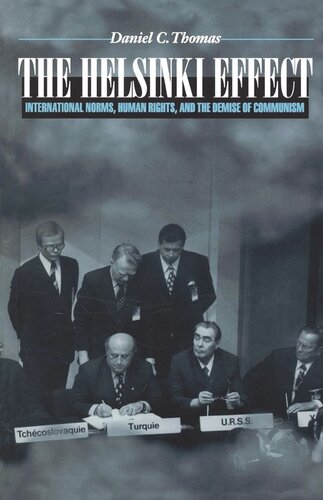

Most ebook files are in PDF format, so you can easily read them using various software such as Foxit Reader or directly on the Google Chrome browser.
Some ebook files are released by publishers in other formats such as .awz, .mobi, .epub, .fb2, etc. You may need to install specific software to read these formats on mobile/PC, such as Calibre.
Please read the tutorial at this link: https://ebookbell.com/faq
We offer FREE conversion to the popular formats you request; however, this may take some time. Therefore, right after payment, please email us, and we will try to provide the service as quickly as possible.
For some exceptional file formats or broken links (if any), please refrain from opening any disputes. Instead, email us first, and we will try to assist within a maximum of 6 hours.
EbookBell Team

4.1
30 reviewsHuman rights norms do matter. Those established by the Helsinki Final Act contributed directly to the demise of communism in the former East bloc, contends Daniel Thomas. This book counters those skeptics who doubt that such international norms substantially affect domestic political change, while explaining why, when, and how they matter most. Thomas argues that the Final Act, signed in 1975, transformed the agenda of East-West relations and provided a common platform around which opposition forces could mobilize. Without downplaying other factors, Thomas shows that the norms established at Helsinki undermined the viability of one-party Communist rule and thereby contributed significantly to the largely peaceful and democratic changes of 1989, as well as the end of the Cold War. Drawing on both governmental and nongovernmental sources, he offers a powerful Constructivist alternative to Realist theory's failure to anticipate or explain these crucial events.
This study will fundamentally influence ongoing debates about the politics of international institutions, the socialization of states, the spread of democracy, and, not least, about the balance of factors that felled the Iron Curtain. It casts new light on Solidarity, Charter 77, and other democratic movements in Eastern Europe, the sources of Gorbachev's reforms, the evolution of the European Union, U.S. foreign policy, and East-West relations in the final decades of the Cold War. The Helsinki Effect will be essential reading for scholars and students of international relations, international law, European politics, human rights, and social movements.